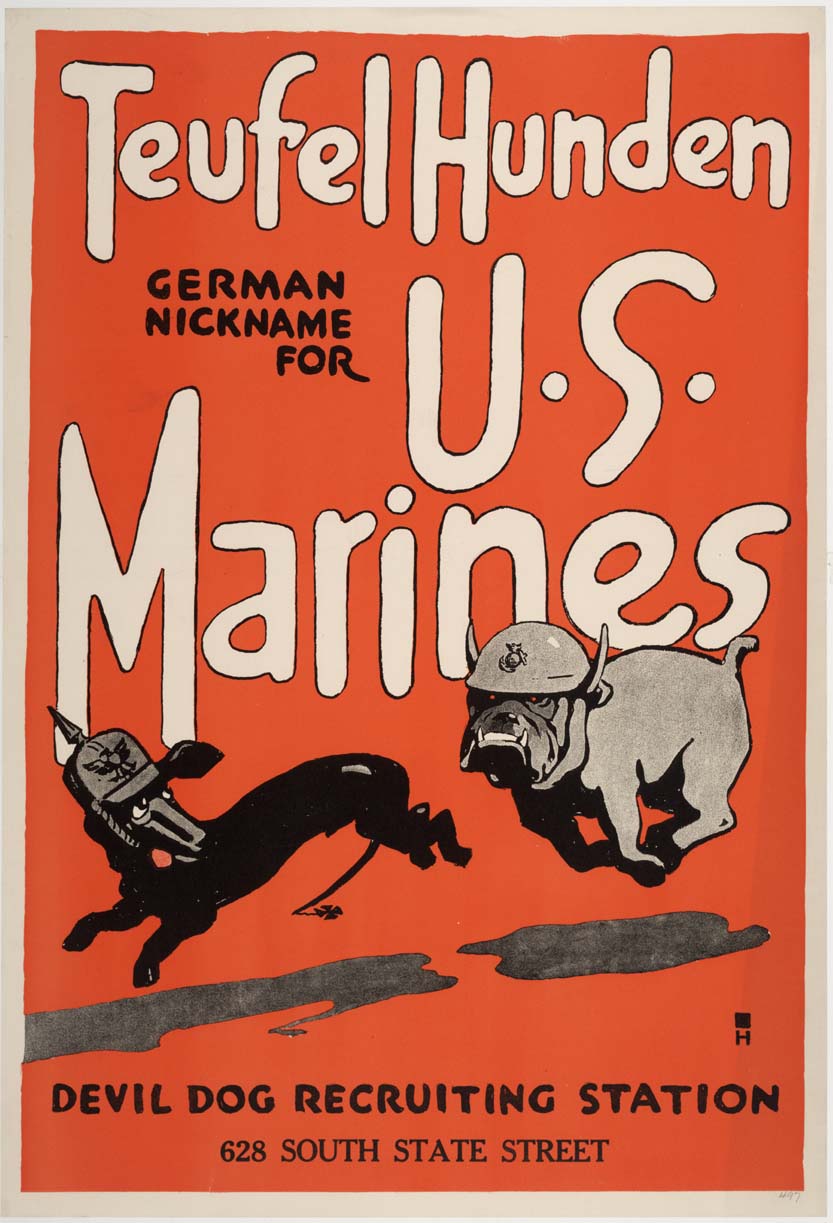
The calendar could not be more cooperative in the first week of this blog's existence, as it has allowed us to cover three of our favorite things: cold Germans; over-zealous Frenchmen; and now, the U.S. Marine Corps.
After America entered the First World War in April of 1917, the country was caught in the same patriotic fervor that had gripped European nations in the late summer and fall of 1914. Clearly, report after report of the horrific carnage and waste in the trenches of the Western Front had done nothing to dissuade American boys from thinking a great adventure awaited "Over There."
That first April, hundreds of thousands of Americans volunteered for the armed forces, and they were quickly joined by the millions of draftees Uncle Sam needed to back up his promise to defend democracy. By year's end, French ports were teeming with American supplies and cocky young Yanks itching for a fight. Alone in this group of army citizen-soldiers was a brigade of United States Marines, professional fighters seasoned from their role as Teddy Roosevelt's "Big Stick" in Central America.
When revolution forced Russia out of the war, the Germans were able to free up huge numbers of men and equipment to redeploy to the Western Front. In the spring of 1918 they used these resources to launch an offensive aimed at destroying the Allies before the untried Americans could be put into battle. It almost worked, as they penetrated further than they had since the first days of the war, but were halted just 40 miles from Paris after American units saw their first combat.
The Germans then turned to try and flank the capital, and on June 1, 1918 entered Belleau Wood, a forest occupied by French troops. Just arriving to the front and filling in the line to the right of their ally, the Marines saw French forces fleeing from their positions. Told that the situation was hopeless and to turn back, Captain Lloyd W. Williams uttered the famous words "Retreat? Hell, we just got here." Aren't Marines fun?
The Marines, soldiers of the U.S. Army's 9th Infantry and the French stopped the attack, but then had to enter the woods themselves to clear out the remaining Germans. To do this, they attempted the same frontal assaults on fixed positions that had failed so miserably at places like Verdun, Ypres, and even Gettysburg the century before. Even with the wholesale slaughter seen up and down the Western Front, tactics had still not evolved enough to avoid so costly a sacrifice. The Marines entered the woods shoulder to shoulder, bayonets fixed, and were mowed down by German machine guns.
Yet as usual, the individual valor of the Marine was not absent during these bloody assaults. Under fire, out-numbered and out-gunned, two-time Medal of Honor recipient Sergeant Dan Daly led his men in an attack with the stirring cry "Come on you sons of bitches, do you want to live forever?" Shocked at the ferocity of their fighting and impressed by their professional attitude, the enemy was said to distinguish Marines from army units with the nick-name "Teufelhunden," a crude German translation of "Devil Dogs."

On June 26, 1918, after nearly a month of fighting throughout the woods, the Marines and French soldiers finally cleared out the last of German resistance. With the German spring offensive finally snuffed out, the momentum shifted to the Allies, who soon began their own offensive into the German line. So depleted by their last gasp attempt at winning the war, and faced with the prospect of fighting millions of fresh American troops, the Germans were near the end. Nevertheless, the suicidal frontal assaults and bloody fighting continued for another four months.
The final exclamation point on the Battle of Belleau Wood was a sparse report dispatched to American headquarters after the forest was cleared. Brief and to the point, qualities every Marine values, the report summed up the battle simply and humbly: "Woods now U.S. Marine Corps entirely."









No comments:
Post a Comment